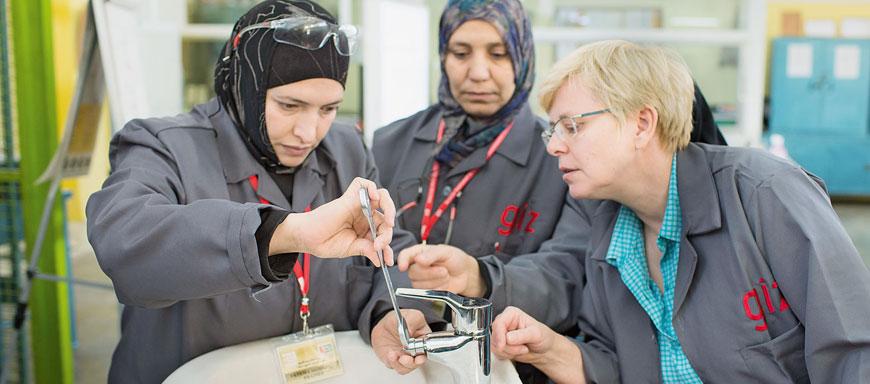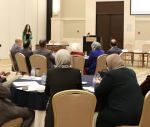You are here
German agency trains women in plumbing profession
By Camille Dupire - Sep 20,2017 - Last updated at Sep 20,2017

Jordanian women are seen during a plumbing training course conducted by the German Development Cooperation recently (Photo courtesy of the German Development Cooperation)
AMMAN — In a country where 81 per cent of women are unemployed, according to UNHCR figures, it is highly unconventional to see women participate in a male-dominated profession like plumbing.
This is, nonetheless, the path that some 176 women have chosen through the German Development Cooperation (GIZ)’s first phase of the project “Training for water and energy efficiency”.
Some 215 additional women are scheduled to follow their lead in the recently launched project’s second phase titled “Vocational Training and Skills Enhancement For Jordanians and Syrian Refugees in the Water Sector [VTW]” that trains local men and women to professional plumbing techniques.
On the occasion of the German Week 2017, the Vocational Training Institute of Mafraq has opened its doors to the public to present the achievements of its project’s beneficiaries through hands-on demonstration sessions by the centre’s students and teachers.
GIZ launched its project in 2014, with the aim of training Jordanian and Syrian refugee women to become professional plumbers with a two-headed approach.
“First of all, we wanted to contribute to solving the water issue nationwide through a grassroots approach,” Hind Al Shdaifat, component manager at GIZ told The Jordan Times on Tuesday.
According to the GIZ website, “virtually all directly available water resources have been tapped in Jordan, but they are often only used to a limited degree or very inefficiently. Estimates indicate that up to 40 per cent of the water transported by pipe is lost nationwide because pipelines are dilapidated and have sometimes been installed unprofessionally and are improperly maintained”.
“Pipelines are old, and there is also a lack of skilled professionals who can install, service and repair them. Water connections and pipeline infrastructure that have been improperly installed and repaired and the shortage of qualified male and female plumbers are also leading to water losses in residential buildings,” the website added.
Partnering with the Vocational Training Corporation (VTC) and vocational training institutes in the Amman and Irbid Governorates, VTW provides two-month courses, including a two-week field training, teaching women how to cut iron pipes, connect them, fix leakages behind a wall, and all the other necessary skills to become a professional plumber.
While prejudices prevail at the onset of each training, the participants quickly forget about them, diving head first into the world of plumbing. “When they go on the field for the first time, the women are worried as they tend to be received with criticism or even mockery,” Al Shdaifat explained.
“But, each time, as soon as they finish, people are so impressed with the quality of their work that they totally change their mind,” she added, noting that some clients now specifically ask for female plumbers
In the face of stereotypes and reluctant attitudes of society, the women have replied with even more perseverance.
“When a man plumber is called to fix a leakage, he tends to leave a mess after him, from what I have been told. But, with women, the work is done professionally and tidily,” the component manager noted.
Moreover, the training also provides these women with prospects for the future and a means of supporting their families. “Most of these women got involved because they wanted to be able to fix the plumbing inside their house without having to call a professional,” Shdaifat continued.
One of the project beneficiaries, Fatima Ahmad Mubarak said she has gained a greater sense of self-respect and confidence since she graduated from this programme. “I intend to work for myself, I want to be independent of a man’s income,” Mubarak was quoted in a GIZ statement as saying.
The participants expressed their hope that this initiative will help pave the way for more women getting involved in male-dominated sectors, slowly changing the patriarchal mentality prevailing in the labour market.
In parallel, GIZ has partnered with the Ministry of Water and Irrigation to implement media campaigns and raise public awareness on the need to preserve water resources and to motivate people to take action at their level.
“Jordan is one of the world’s most arid countries in terms of the amount of water available per capita and we need everyone to get involved to prevent this situation from getting worse every year,” said.
Related Articles
AMMAN — A centre will be opened to train women on in-house plumbing to further integrate them into the male-dominated sector, Minister of Wa
AMMAN — A tap problem in her house prompted Thekrayat Abu Al Qasem to learn the basics of plumbing and depend on herself to troubleshoot any
AMMAN — The Ministry of Water/Water Authority, in cooperation with the German Agency for International Cooperation (GIZ), on Wednesday held

















